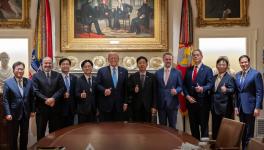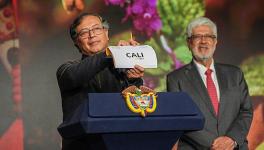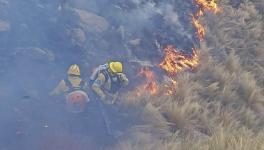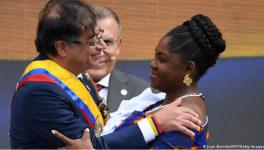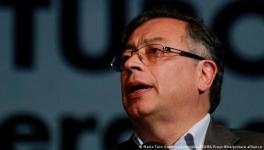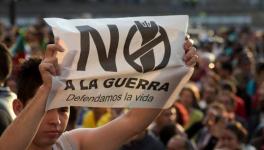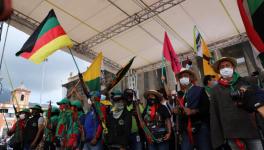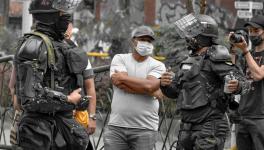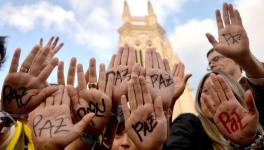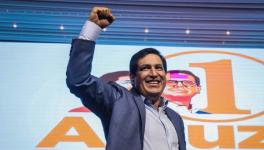Colombia: Stories of Pain and Resistance
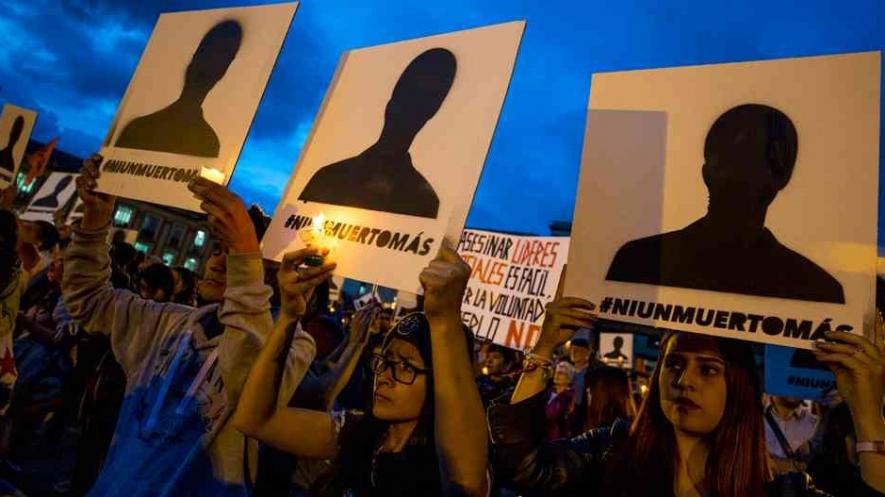
The Colombian tragedy continues without an end in sight. The last two weeks have seen a worrying surge in assassinations of social leaders, human rights defenders and ex-combatants. 19 such leaders have been assassinated since the turn of the decade. The demand by organizations and movements for protection and justice for the leaders – 800 of whom have been assassinated since 2016 – are being ignored. Meanwhile, in the first week of January, the news magazine Semana released an extensive exposé revealing that the Colombian army was illegally listening to and indulging in surveillance of journalists, politicians and judges, including a Supreme Court judge. Law and order, protection and guarantee of the most basic rights remain elusive in Colombia.
Who is being assassinated?
Since January 1, 2020, 17 social leaders, community leaders and human rights defenders, as well as one former combatant of the Revolutionary Armed Forces of Colombia (FARC), were assassinated by paramilitary groups and hitmen. Beyond the numbers and the labels, who are the people who are being targeted?
The year began with the violent assassination of former FARC combatant and signatory of the peace agreement, Benjamín Banguera, on January 1 in Guapi, Cauca. The next target was Carlos Cardona who was killed on January 2. He was set to work as the director of the Ituango Hospital in Antioquia and was celebrating with friends when an unidentified armed man approached him and killed him.
22 year-old Cristian David Caicedo was assassinated in execution style on January 3 by a group of armed men in the rural area of Guapi, Cauca. Caicedo was the son of a well-known regional Black leader who was the legal representative of the Community Council Guapi Abajo and a member of the National Space of Prior Consultation of Black Communities.
Anuar Rojas Isaramá was a 29-year-old member of the Indigenous guard from the Agua Blanca community in Nuquí, Chocó and was assassinated by armed men on January 5, but the crime was only reported by the public institutions on January 9. According to the mayor of Nuquí, the assassination of Isaramá caused the displacement of 28 families (123 people) who are currently taking refuge nearby.
An Indigenous Nasa elder, Virginia Silva of the El Canelo Reservation in Páez, Cauca was assassinated at her home in front of her husband on January 7. She was 71 years old. According to Sonia Hurtado Ducue, president of the Association of Nasa Cxha cxha Cabildos, Silvia had received death threats from armed groups before her assassination.
Puerto Guzmán, Putumayo, saw 3 assassinations and one attempted assassination on January 7-8. Puerto Guzmán is in the south-west of Colombia and lies in the midst of an important and heavily disputed drug-trafficking corridor. Those who oppose these activities and promote the substitution of illicit crops are met with violence.
37-year-old Gloria Ocampo, who lived in the rural region of Puerto Guzmán, was assassinated in her home along with her neighbor on January 7. Ocampo was an important leader in promoting crop substitution on a departmental level and within her community and worked on developing alternative options for production and commercialization despite lack of support from the government.
Peasant leaders Óscar Quintero and Gentil Hernández were both assassinated on January 8 in Puerto Guzmán. In the case of Quintero, armed men arrived at his house, dragged him out and assassinated him in front of his wife.
The same day, Mireya Hernández Guevara, the former treasurer of a Community Action Board, was shot and killed in Algeciras, Huila.
On January 10, a total of six assassinations took place in different regions of the country. Amparo Guejia Mestizo, Nasa Indigenous leader and founder of the Landless Workers Movement – Grandchildren of Quintin Lame – was assassinated along with her son Juan Pablo Dicué in Caloto, Cauca. The organization is affiliated to the national platform of social movements, the Patriotic March. Also in Cauca, human rights defender Nelson Enrique Meneses, 29, was shot and killed in his home in front of his wife and 3-year-old daughter in the municipality of Inza. He was a member of the Peasant Association of Inzá Tierradentro, part of the National Association of Zones of Peasant Reserve and the Patriotic March.
In Chiriguaná, Cesar, unidentified armed men killed the leader of a community action board, Henry Cuello. Tulio César Sandoval, who was part of the Coordinator of Coca, Marijuana and Poppy Growers and the Patriotic March in the Catatumbo region of North Santander, was also violently assassinated in his home in front of his family members on January 10. In Turbo, Antioquia former council member Sergio Narváez was assassinated in his home.
The next day, January 11, John Freddy Álvarez was assassinated in Algeciras, Huila. He was the president of the Association of Peasant Workers in Algeciras, Huila and a member of the Patriotic March.
Jorge Luiz Betancourt was shot dead by armed men on January 13 inside his home in Montelíbano, Córdoba while he was with his family. According to the Cordobexia Foundation, Betancourt was a community and sports leader.
On January 14, 30-year-old Jaiber Alexander Quitumbo was shot dead by armed men while he did agricultural work in the Indigenous reservation of Toribío.
Another assassination took place in Puerto Guzman municipality on January 16 when Yordan Tovar, member of the Trade Union of agricultural Peasant Workers of Putumayo, was assassinated at the community store of the union located in a village.
Organizations condemn govt. indifference
The rise in the assassination of peasant leaders, Indigenous leaders, human rights defenders and others has shaken Colombian society. According to these numbers, the genocide of social leaders in the country is no where near stopping and may even get worse this year.
The movement, the Patriotic March, sent a letter to president Iván Duque requesting an urgent meeting with him due to the increase of attacks and assassinations faced by members of the organization. They stated in the letter that in two days, four members of their movement had been assassinated (as of January 10). The letter pointed out that 42 members of the organization had been assassinated since Duque took office “without the Colombian state, in our opinion, taking the necessary measures to stop this grave situation and sanction those responsible.”
They added that the Colombian state “has not taken the necessary effective measures to foresee the continuity of violence against us” and that there is an “ineffective attitude while they [the government] are conscious of the grave situation of socio-political violence in Colombia and in particular against the members of the Patriotic March, they should go further than the current measures and fulfill the commitments acquired by the institutions of the Colombian state.”
The violence against social leaders even caught the attention of the Security Council of the United Nations. On January 15, the Security Council released a declaration regarding the “grave situation of security” and demanded that the Colombian government take ‘effective actions” to stop these crimes.
The government, on the other hand, has been embroiled in a grave wire-tapping scandal with the National Army. It has completely denied that there is a policy of extermination of social leaders and human rights defenders by illegal groups. Francisco Barbosa, Duque’s presidential advisor on Human Rights and International Affairs, claimed that “Here, there is no policy of extermination or a systematic policy, here what exists is diverse motivations against social leaders, linked to criminal phenomenon, this idea of it being systematic must be rejected.”
Despite this complicated panorama, social movements, Indigenous, Afro Descendant and peasant organizations, trade unions, and human rights organizations are preparing for a national strike on January 21. The mobilization will commemorate two months since the beginning of the wave of mobilizations, strikes, cacerolazos and other protest actions against the government of far-right Ivan Duque and its war-mongering, neoliberal policies. One of the principal demands of the strike is that the government act to stop the genocide of social leaders, human rights defenders and ex-combatants in the country.
The social movement platform, the People’s Congress, released a statement expressing solidarity with the Patriotic March and condemning the increased violence against social leaders. They also called on the people of Colombia to “take to the streets to protest as part of the mobilizations that will begin on January 21.”
Get the latest reports & analysis with people's perspective on Protests, movements & deep analytical videos, discussions of the current affairs in your Telegram app. Subscribe to NewsClick's Telegram channel & get Real-Time updates on stories, as they get published on our website.









